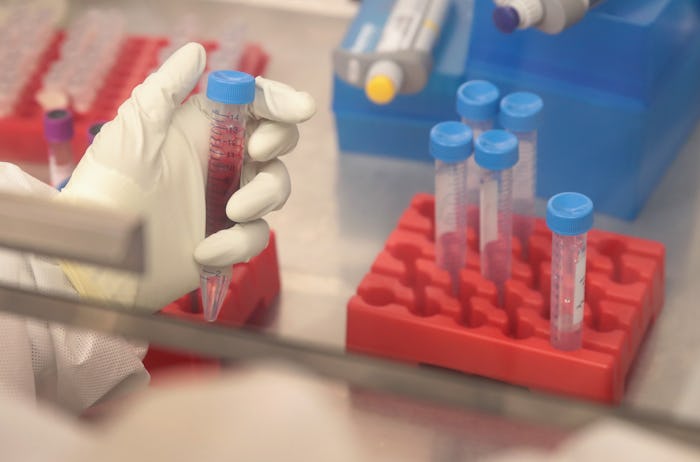Life

How Does Someone Transfer Zika On Contact? It Might Be Possible
As if we all needed one more thing to freak out over, a mysterious Zika case in Utah has some researchers wondering how someone can transfer Zika on contact alone. Cue the groans all around. Don't we all have enough to worry about? Before you start barring yourself in your home and putting on a hazmat suit, know that Zika transmission through contact with an infected patient has not yet been 100 percent proven. But the story of a Utah man who was caring for Zika infected father and contracted the virus still has people talking.
A few things about this have Zika researchers scratching their heads, according to a report released by the Centers for Disease Control and Prevention last week. The first patient was an elderly man who had contracted Zika while traveling. That patient died of possible related causes because of the virus, but he also had other health conditions. The amount of Zika in system was also very high. The son had not traveled, and since Utah isn't home to Zika mosquitos, some health officials think he may have got it while caring for his father.
Typically you can get Zika from a mosquito bite or by having sex with an infected patient. But there have been no cases of people getting it from "sneezing or coughing, routine touching, kissing, hugging or sharing utensils," according to the CDC.
So how did the son get it?
The CDC interviewed 19 family members and healthcare workers. All family members, including the mystery patient, touched, hugged, kissed, and were present during routine urine, stool, and blood sampling of the elderly man. Everyone else tested negative and the son tested positive.
Despite the high level of Zika in his father's blood — 100,000 more copies than the average patient — the son quickly recovered, as is common with Zika patients, and is healthy now. But the fact that he got it in the first place is troublesome. Dr. Satish Pillai, who is leading the CDC’s Zika Response team in Utah, said this July, when the case was first reported, "There’s a lot we don’t know about Zika virus and we are still doing a lot of investigation to determine whether Zika can be spread from person to person.” The response team tested mosquitos in the area and offered door-to-door testing along with interviewing neighbors to see if anyone had traveled or had symptoms, according to the CDC report.
It could have been the crazy high amount of Zika in the elderly patient that made it possible to transmit or some other piece of evidence that the man might not have disclosed. For pregnant women, being able to catch Zika on contact would mean that taking precautions, like not traveling, using bug spray, and abstaining from sleeping with partners who have been overseas, aren't really enough, so while this case was troubling, it at least didn't involve any potential birth defects or sick children.
More research has to be done by the health agency before any new recommendations are made by the CDC or any conclusions are reached in the case. For the time being, it's best to just heed the CDC's previously released warnings about staying Zika free. And to go get tested if you think you could have been infected.
There's no need for panic — for now.